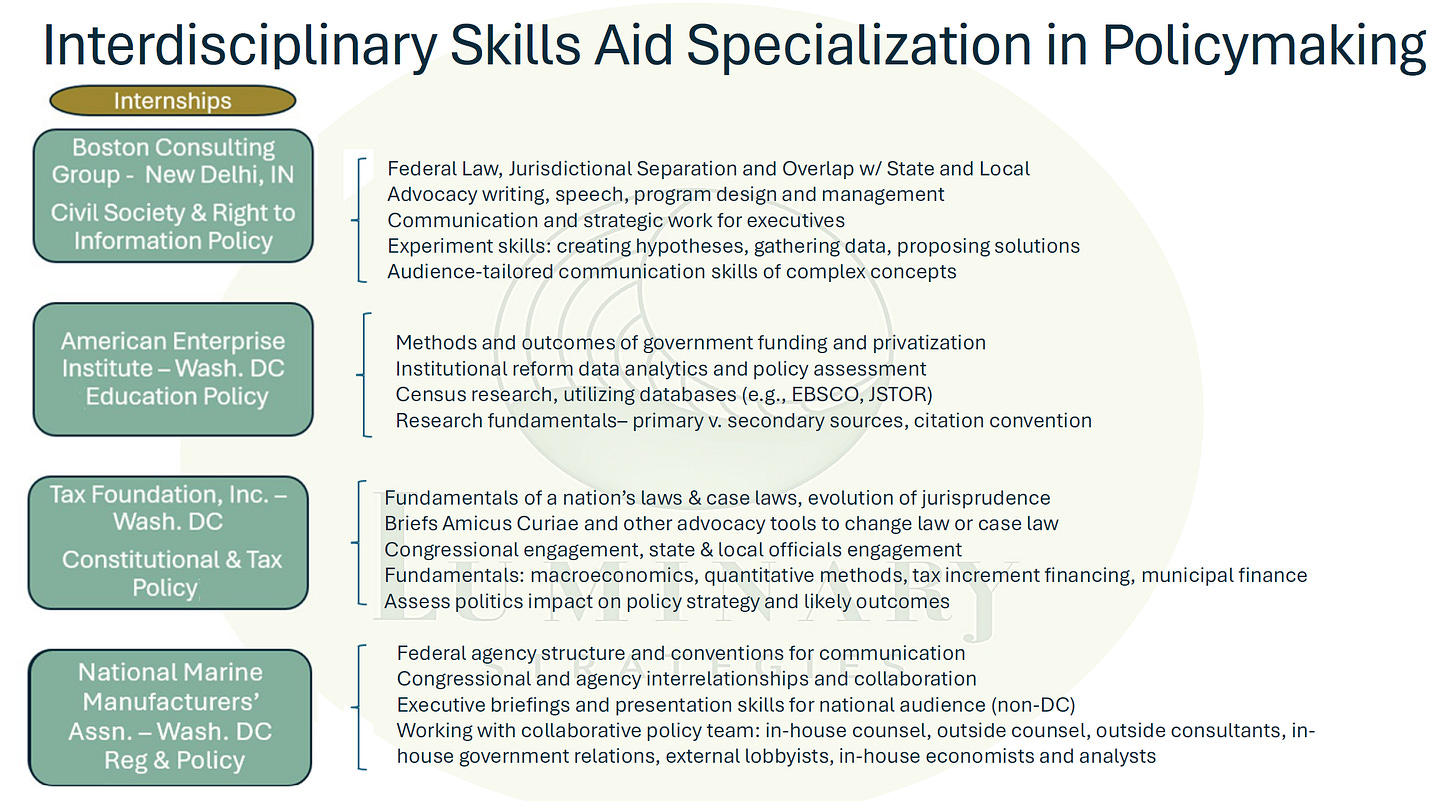Diversify Your Internships & Early Career Positions for Policymaking Prowess and a Higher Salary
A quick hit for new professionals and university students looking to maximize their potential for a well-paid policy position.
Diversify your internships and early job experiences. It's not just about accumulating positions; it's about strategically building a skill set that will make you indispensable, adaptable, and well-positioned for lucrative opportunities in the ever-evolving landscape of public policy.
In the competitive world of policymaking, a diverse portfolio of internships and early career experiences can be your ticket to success and higher earning potential.
Be excited, not disheartened, in taking internships and research positions in fields seemingly unrelated to the “job of your dreams.” You’re developing comprehensive skills that make your talents transferable across multiple future roles and responsibility areas and the more you have, the faster you’ll outstrip your competition.
The key to maximizing your potential lies in the breadth of your skill set and your depth: there are no opposites, only complements.
A lack of interdisciplinary training can hold you back at every professional level: I routinely have conversations with senior managers or junior executives who cannot get the next “top job” because of a lack of technical consulting, public speaking, or financial planning and accounting knowledge.
Fill gaps, at every age, at every phase of your professional journey.
Examples:
A. Advocacy writing honed at a consulting firm in any industry, complements data analytics skills gained at a think tank: together, both of these become crucial skills you must have as a senior engineering and product compliance specialist to advocate for your business or industry at venues like NERC, FERC, or standards setting bodies like IEEE or NCWM (the latter of which, is a critical organization governing standards for Electric Vehicle charging).
B. Work requiring application of federal or state law pairs perfectly with experience in congressional or statehouse engagement, but also helps your capacity to help any kind of business handle compliance with any set of rules or requirements. The average medium-sized U.S. business has hundreds of compliance requirements. These jobs require people trained in diligent recordkeeping, tracking, and program management functions who also understand complex laws and regulations with real precision and deep context so that multiple audiences can receive information needed to built strong compliance cultures.
Be ready to articulate for future hiring personnel what it is about your prior work that makes you uniquely capable to take on complex policy work. Here is how I used to talk about my work in my early policy role interviewing days:
The core skills you will develop in pursuing interdisciplinary work cannot be arrived at by staying in the same field or industry - in most cases - in our current job economy. People are encouraged to move around to acquire new skills, something that came easier in the job market twenty-five years ago. There are some company types - like major public utilities - where apprenticeship and rotation can still allow an indivdual worker to rotate through various skill challenges in the same position. (I recently recorded a podcast with someone who had this very opportunity).
However, it is more rare than not, particularly at large companies with higher-paying policy jobs, that internal-facing positions allow an employee or intern to do external-facing work at a depth that translates into meaningful experience, or vice versa. To avoid getting “pigeon-holed” as a “policy person” or a “technical person”, make the effort to have both on your resume before you go after a major policy advocacy position. It is easier to show companies that you already have these diverse skills, than try to rotate into policy versus non-policy positions once on the inside. Seeking out the opportunity to be both - verbally and analytically powerful while also technically proficient - will turn into higher monetary compensation and a level of professional effectiveness that surpasses expectations.
— Arushi Sharma Frank




